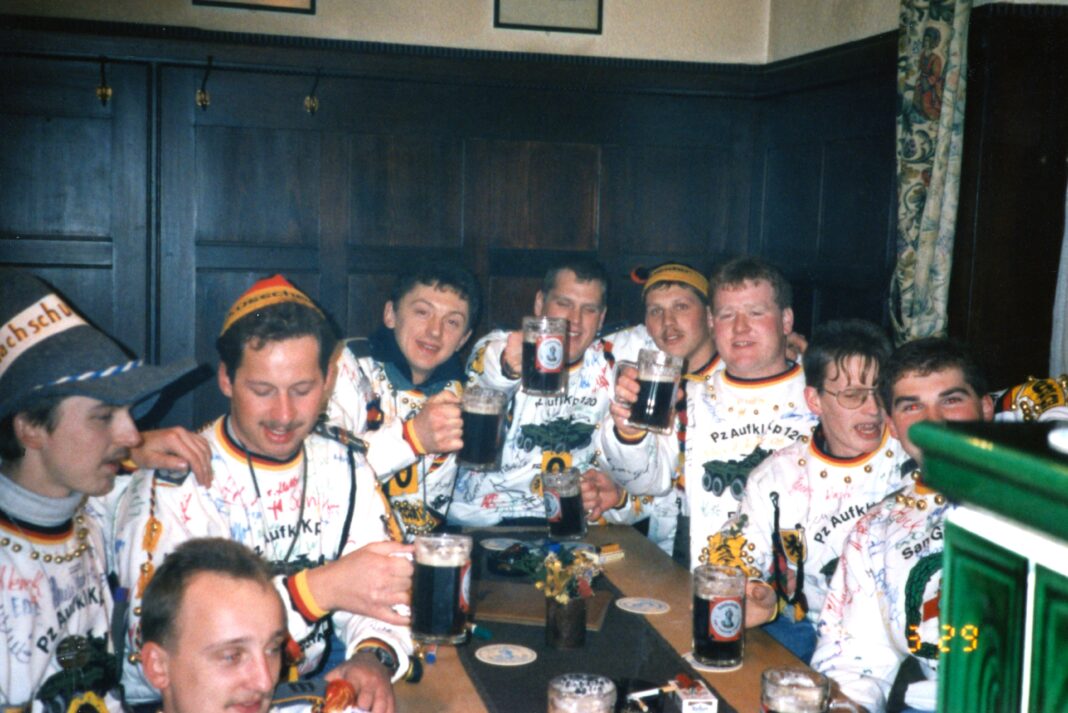Featured photo: The fans at Mahr’s in Bamberg and their Weizenbocks, 1995. Photo by the late, great George Schroeder.
The latest installment of my ongoing “40 Years in Beer” narrative takes us back to 1995, when I was faced with a dilemma: the beer and pizza business was picking up, and my traditional travel objective of lengthy overseas stays was becoming problematic.
It remains that pragmatism is the most useful concept. If trips needed to become of shorter duration, they’d be taken more often. At least it was the golden age of frequent flier miles. I also began thinking about ways to organize group excursions for F.O.S.S.I.L.S. club members, Rich O’s customers and just about anyone else who wanted to come along.
The first such “escorted” excursion came in March of 1995, as linked below. The last came in September, 2008. They took place with small groups and large; by train, minibus, motor coach and bicycle. When the Bank Street Brewhouse project got real and I became a craft beer localist (rather like KISS performing without makeup, eh?) my spare time evaporated, and for three whole years Europe suddenly was off limits, group or solo.
It made me a dull boy — and KISS put the makeup back on. Here is how the road trips began, with an oom-pah soundtrack by Johnny Cash.
Note that when I look at my Indy friend Ron Smith’s Master of Beer Appreciation (MBA) tours, they mirror what I always thought this sort of endeavor should be. Tell him I sent you.
—
Even in the best of times, Great Britain’s traditional pub culture is the subject of fervent, impassioned debate. Will the nation’s glorious pubs survive changing tastes, injurious taxation and licensing regimes, and the encroaching death knell of gentrification? What of the country’s singular approach to brewing, serving and drinking ale?
Three years ago I offered a consideration of these pressing issues.
To no one’s surprise, the cask debate continues. High quality and a fair price? I’ll have another of those — and is that chip shop around the corner still open?
The insanity of cask beer, by Matthew Curtis (CAMRA)
(Tim Dewey’s) approach to cask beer is a democratic one: make a product to as high a standard as possible, and then sell it for a price that you consider to be fair. This being a democracy means you don’t have to agree with him that it is fair. However, sitting later on with a pint of (Timothy Taylor’s) Boltmaker in the pub that is this beer’s namesake, the Boltmakers Arms, I find nothing to complain about in terms of either quality or price. Here, in this glorious little pub, with a lovely pint of beer, well, it just feels like the most normal thing in the world.
From the way-back machine, all the way to the time when the communists had a very good idea, which of course conflicted with capitalist notions of planned obsolescence.
Smashing idea: how East Germany invented ‘unbreakable’ drinking glasses, by Jens Malling (The Guardian)
This is Superfest, East Germany’s “unbreakable” drinking glass. Invented in the industry-rich but resource-poor socialist German Democratic Republic, Superfest glasses were designed with the aim of making them last five times longer than ordinary drinking glasses. They were soon found to be 10 times more durable.
Chairs can be durable, too. Torturous, but long-lasting, and then you wedge your aging frame into one, glance at the listings, and see seven IPAS, three sours and Captain Crunch Tequila Barrel Aged Imperial Cream Ale on tap on a 95-degree summer’s day.
Aargh.
Buns of Steel: Why Every Brewery Taproom Has *That* Chair, by Joshua M. Bernstein (Craft Beer)
The Chair has become the shaker pint of taproom furniture: ubiquitous, affordable, stackable, easy to clean, and largely unloved. No one is excited to sit in The Chair. But there is rarely an option, like a taproom with all IPAs on tap. The Chair keeps proliferating, too. In an average year, restaurant supply company WebstaurantStore.com will sell around 10,000 versions of The Chair from Lancaster Table & Seating. How did such polarizing seating rear up at taprooms?
I’ve mentioned the emerging American Craft Beer Hall of Fame.
The American Craft Beer Hall of Fame has been established to honor, celebrate, and commit to history those people who are responsible for initiating, sustaining, and promoting the American craft beer industry. This Hall is to ensure that the memories of their contributions and achievements will not fade with time.
I’ve been asked to participate in the ACBHOF as an advisor, and as a lifelong baseball fan involved in hundreds of heated barroom conversations about Cooperstown, I take this honor quite seriously. I’m delighted to see the emergence of ACBHOF “wings.”
American Craft Beer Hall of Fame
Taking a page out of the Baseball Hall of Fame playbook, we set out to create various “wings” to accommodate the many people from different areas of the craft beer industry.
Regular readers of Hip Hops might recall a previous column from 2022, in which I offered an overview of the Louisville metropolitan area’s brewing history in five eras, and asked a question about beers: “Using the above eras as a rough framework, what would a list of Louisville’s metro area Hall of Fame beers look like?”
Hip Hops: Dispassionate and purely objective thoughts about the Louisville Beer Hall of Fame
You will note my purposeful use of the proper boundaries: “Louisville metropolitan area,” rather than merely “Louisville.” Invariably, those of us trapped in the uncharted wilds of SoIN are omitted from discussions of “Louisville” beer, and frankly, it gripes my cookies. The Louisville metropolitan area (population 1,395,855 in 2020) is defined thusly:
As of 2023, the U.S. Office of Management and Budget defines the Louisville–Jefferson County MSA as including Bullitt, Henry, Jefferson, Meade, Nelson, Oldham, and Shelby Counties in Kentucky and Clark, Floyd, Harrison, and Washington Counties in Indiana.
Whether it takes the form of a Hall of Fame, bricks ‘n’ mortar museum or informative web site, I believe in telling the history of what we’ve achieved right here in this city and its environs. If my involvement in the American Craft Beer Hall of Fame enables a wee bit of conceptual trickle-down to the grassroots, then pull me one of those 150 IBU Double IPAs. If I can’t propose a toast with it, there’s a floor nearby in need of stripping.
—
To conclude, this story came across the wire just as I was putting the final touches on this column. It’s gladdens my three-sizes-too-small heart to learn that The Grales campus appears set to grow again.
Long live that campus; long may they run.
The Grales (plural) are the gold standard for beer classicists like me. In a real burg, I could get there from New Albany via a couple of subway or tram segments. The struggle? Why, it’s real.
Holy Grale owners buy former KFC site in the Highlands, by Joel Stinnett (Louisville Business First)
A new attraction could be brewing at one of the Highlands busiest intersections.
The triangle-shaped slice of land at 1004 Bardstown Road, where Baxter Avenue and Bardstown Road split, was sold earlier this month to Bierhaus LLC for $1.425 million, according to a deed filed with the Jefferson County Clerk’s Office.
—
Previously at “Hip Hops”: How many breweries are there in America, really?
Hip Hops: Handbags, gladrags, weird beers and 139,351 synapses later




















 Roger Baylor is an entrepreneur, educator, and innovator with
Roger Baylor is an entrepreneur, educator, and innovator with 





